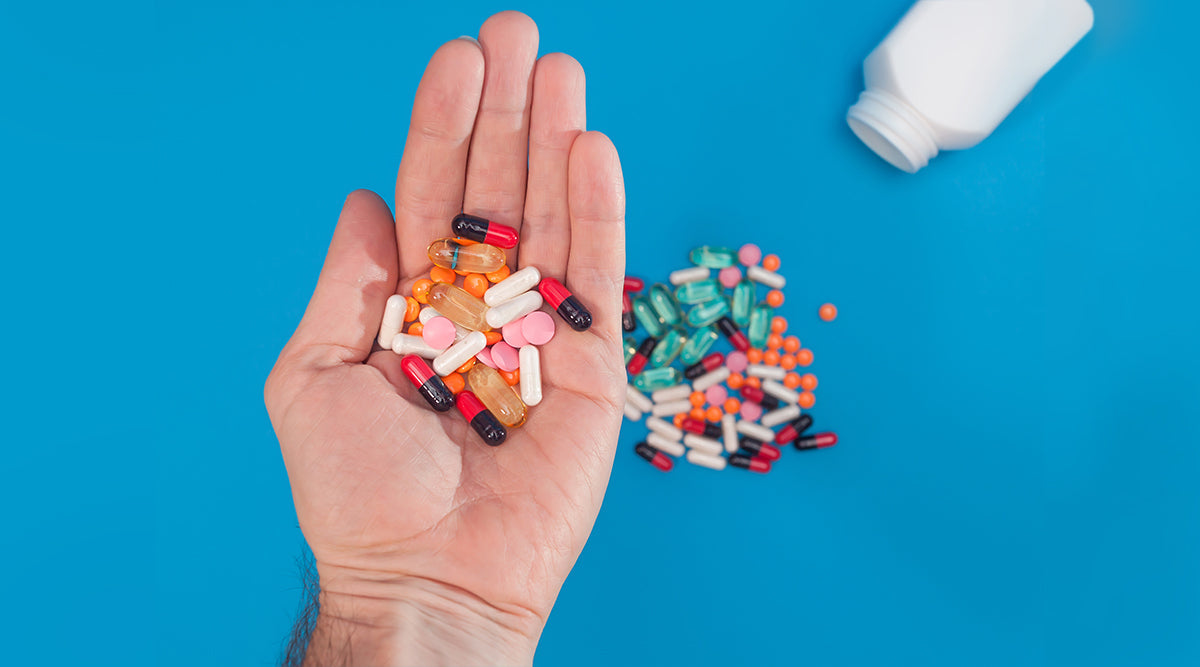How It Works Mobile
Health Benefits Mobile

At What Age Does a Man Stop Ejaculating?
At What Age Does a Man Stop Ejaculating?
7 min read
7 min read
Ejaculation frequency can change with age, but most men never entirely stop. Here's what to expect as you get older and how to maintain a healthy sex life at any stage.

Science-based guidance to improve your sexual health & performance.
By The Private Gym Team
Table of Contents
- Male Reproductive System 101: Key Functions and Changes Over Time
- Is Age Really Causing My Sexual Problems? Myths vs. Facts
- Erections, Ejaculation, and Aging: A Decade-by-Decade Overview
- Key Takeaways: How Aging Impacts Male Sexual Function
- How to Maintain Sexual Activity as You Age: Effective Tips
- Take Control & Actively Maintain Your Sexual Health
Aging isn’t kind to the male body, and the penis is no exception. As we get older, changes in sexual performance and ejaculation are inevitable.
The burning question for many men is, “When does it all stop?” While there’s no one-size-fits-all answer, it’s clear our sexual health and performance can decline with time. Psychological factors, such as stress and anxiety, also significantly affect sexual health.
Maintaining a healthy lifestyle, which includes regular exercise, a balanced diet, and adequate sleep, can help mitigate the decline in sexual health and performance. The real issue is that most of us don’t do much about it. We let these changes unfold, ignoring early signs and hoping they resolve independently. But they rarely do. The truth is that understanding how age impacts ejaculation and sexual function can help you take control before it’s too late.
Male Reproductive System 101: Key Functions and Changes Over Time

The male reproductive system is a complex network of organs and hormones that work together to produce, maintain, and transport sperm. As men age, various changes occur in this system, including a gradual decline in testosterone levels. These changes can affect sexual performance, libido, and overall reproductive health. Aging can also lead to sexual dysfunction, impacting various aspects of male sexual health.
Ejaculation Explained: Essential Facts on Semen Release and Orgasm
Ejaculation is the process by which semen is released from the male body, typically during orgasm. This complex event involves the coordinated effort of multiple components in the male reproductive system.
During sexual intercourse, ejaculation plays a crucial role in male sexual health because it allows for the potential fertilization of an egg. Understanding this process is essential for maintaining overall male sexual health and addressing issues that may arise.
Many older men continue to engage in sexual activities, highlighting the importance of understanding ejaculation and sexual health.
How Ejaculation Works: The 2 Stages and Key Muscle Actions
The process of male ejaculation involves releasing semen, which is composed of sperm, prostate fluid, bulbourethral glands, and seminal vesicles, among other substances. The ejaculatory process is divided into two stages:
- Emission: Initial release of secretions into the urethra.
- Expulsion: Fluid is expelled following a response from the nervous system.
During ejaculation, the pelvic floor muscles contract to guide semen from the vas deferens to the urethra. This intricate coordination ensures semen is effectively expelled from the body, playing a vital role in male reproductive health.
Aging and the Male Reproductive System: What Changes After 30?
As men age, the male reproductive system undergoes natural shifts that can affect sexual function. Around age 30, the production of testosterone—a hormone essential for male sexual health—begins to decline, impacting sperm production, libido, and overall sexual function.
Additionally, age-related changes in the pelvic floor muscles can affect ejaculation, leading to weaker or less frequent orgasms. Recognizing these changes can help men take proactive steps to preserve their sexual health as they age. Also, maintaining sexual relationships can help men adapt to these changes and continue to experience fulfilling sexual lives.
Is Age Really Causing My Sexual Problems? Myths vs. Facts

There are many reasons why male sexual health and performance degrade over time. Below are some of the most significant causes, along with links to learn more:
- Prostate cancer surgery and treatment
- Enlarged prostate
- Low testosterone
- Performance anxiety
- Peyronie's Disease
- Heart attack or heart condition
- Vascular diseases that affect blood loss and flow
- Prescription and over-the-counter medications
- Nerve damage
- Atherosclerosis
- Alcohol
- Sports Injury
- Stress
Erections, Ejaculation, and Aging: A Decade-by-Decade Overview
Aging isn’t kind to the penis and sexual performance. As the body changes and testosterone levels drop, the penis also undergoes noticeable shifts in function.
With each passing decade, lifestyle choices, genetics, and other factors catch up with us, affecting our sexual health and performance. Here’s a decade-by-decade breakdown of common changes and what you can do to maintain optimal sexual health.
Ages 18-30: Peak Sexual Power and Common Early Issues

Your sexual appetite is massive. Sex often occupies the front of your mind, and you may need very little stimulation to achieve an erection. Nighttime and morning wood are common, and orgasms tend to be intense with high-volume ejaculation. Testosterone levels peak during these years.
However, many younger men experience premature ejaculation, often caused by factors like overly sensitive penis skin. One proven way to manage this is to strengthen the pelvic floor muscles. Exercise the muscles that support strong ejaculatory control.
Ages 30-40: Subtle Changes and Preventive Measures
During this decade, changes creep in gradually. Your sex drive is still vigorous, but blood flow may require more direct stimulation to achieve a firm erection. Using good lubrication can enhance comfort and arousal.
Recovery time after ejaculation increases. Meanwhile, pelvic muscle strength may start to diminish—addressing it early can help prevent issues like ED. This is a great time to keep your penis in shape with targeted pelvic exercises.
Ages 40-50: Rising ED Risks and How to Manage Them
By 40, nearly 50% of men experience some form of erectile dysfunction (ED), a figure that rises with each decade. You may notice you need more stimulation, and your erections may lose firmness during sex. Orgasms might feel less powerful, and getting a second erection post-orgasm can be difficult.
Key factors include weight gain, inactivity, medications affecting blood flow, Peyronie’s Disease, and weakened pelvic muscles. For more tips, see how to maintain healthy and robust sexual performance in your 40s.
Ages 50-60: Significant Shifts in Sexual Function

This decade often brings the most dramatic shifts. Nighttime and morning erections become rarer, and you may lose your erection before climax. Retrograde ejaculation (where semen travels into the bladder) can occur, typically due to prostate issues.
Sex may feel more like a weekend pastime than a spontaneous activity. Orgasms lose intensity, and both semen volume and force of ejaculation drop. Less blood flow, declining testosterone, and scar tissue contribute to reduced penis size.
A major concern is the prostate: conditions like prostate cancer or its treatments can lead to ED. Learn how to best prepare for and recover from prostate surgery.
Ages 60-70: Coping with Declining Testosterone and Erections
This decade poses more challenges for male sexual function. Testosterone levels dip significantly, reducing libido. Erection quality may require extra coaxing, and you can lose hardness mid-activity. Spontaneous erections largely disappear.
Medications like Viagra or Cialis may not work for all men. If you struggle with erection quality, consider a combined approach using nerve stimulation therapy and pelvic muscle exercise.
Ages 70-80: Maintaining Intimacy Despite Physical Limits
Desire often remains, but it’s far less intense than decades prior. Penile size can continue to decrease, and you might only achieve a partial erection that’s insufficient for penetration. It’s not necessarily a lost cause—options may exist with medical guidance.
Consider exploring combination therapies, such as the aggressive Erection Recovery Program. A thorough discussion with your physician can uncover individualized solutions.
Ages 80-90: Sexual Activity, Health Concerns, and Quality of Life
Although you may still manage occasional sex, many men at this age are thankful they can still stand to urinate. Incontinence may overshadow sexual concerns, so improving urinary tract health via pelvic floor training becomes crucial. Additionally, many men in this age group still manage occasional sexual activities, highlighting the importance of maintaining sexual health.
Ages 90-100: Intimacy in the Golden Years

To quote comedian George Burns: “Sex at age 90 is like trying to shoot pool with a rope.” Sex may be low on your list of priorities. Memories can provide comfort, and if you get an erection, it feels like a chance you shouldn’t waste!
Key Takeaways: How Aging Impacts Male Sexual Function

Changes in Sexual Intercourse with Age
As men age, they may experience a decrease in libido, potential ED, and changes in ejaculation. Both physical and psychological factors contribute.
Maintaining a balanced diet, exercising regularly, and managing stress can mitigate these changes and support overall sexual health.
While aging can reduce the frequency and quality of intercourse, many men remain sexually active well into their 70s and 80s. With the right mindset, medical guidance, and lifestyle choices, a fulfilling sex life is possible.
It’s crucial to understand that age-related changes are not inevitable—proactive self-care can help men preserve a satisfying sexual routine.
How to Maintain Sexual Activity as You Age: Effective Tips

Staying sexually active with age isn’t random—it requires attention and effort. A healthy sexual life is vital for well-being and emotional intimacy.
Think again if you believe you can coast through your golden years without any extra work. The good news? There are multiple ways to keep your sexual energy high. Here’s how:
Exercise to Keep Your Blood Flowing
As you age, circulation takes a hit, and your penis depends on good blood flow to perform. Regular exercise—like brisk walking, swimming, or cycling—helps clear your arteries. Strength training can also boost testosterone.
Don’t Neglect Your Pelvic Muscles
Most men ignore their pelvic floor until problems arise. Pelvic floor exercises fortify muscles essential for erections and ejaculation. If you want to stay in the game, make this a routine.
Watch What You Eat
Your diet strongly affects sexual health. Greasy fast food does you no favors; instead, choose fruits, vegetables, lean protein, and whole grains. Antioxidant-rich foods like berries and spinach help circulation, while omega-3s in salmon support hormone balance.
Stress Less, Perform Better
Stress hampers mood, erections, and overall performance. Coping with stress is crucial as you age. Try deep breathing, yoga, or a relaxing hobby. When stress is under control, sexual function often follows suit.
Keep an Eye on Your Health
Your overall health impacts your sexual performance. Conditions such as diabetes, high blood pressure, and heart disease affect erection quality. Regular check-ups help catch problems early, and proper management can avert further damage.
Explore Sexual Aids and Therapies
There’s no shame in seeking a little help. Whether it’s a medical vibrator, penis pump, or nerve stimulation therapy, the right tools can keep your sex life thriving. Talk to a doctor for personalized advice.
Expand Your Definition of Intimacy
Sex doesn’t have to look the same at every age. Older adults can still enjoy fulfilling sexual experiences by exploring new forms of intimacy and staying open-minded. Extended foreplay and non-penetrative activities can be equally satisfying. Maintaining open communication and exploring new approaches can help sustain fulfilling sexual relationships.
Take Control & Actively Maintain Your Sexual Health

Ultimately, getting older isn’t fun—especially where sexual performance is concerned. However, you don’t have to let these changes happen without a fight. Educate yourself, adopt healthy habits, and remain proactive. Sex is significant on many levels, and you deserve a robust sex life throughout the decades.
RELATED ARTICLES

The Ultimate Guide - How to Last Longer in Bed
20 min read

Premature Ejaculation Pills - Do They Work?
11 min read
Recent Articles
- 12 Types of Female Orgasms: How to Help Her Experience Each One
- Why I Recommend You Get a Tantric Couch
- The Downsides of Penis Enlargement Surgery: Risks and Alternatives
- Bathmate vs. Air Pumps
- Bathmate Results: Penis Pump Before & After
- Side Effects of Catuaba
- Health Benefits of Catuaba
- 12 Essential Tips for a Healthy Penis
- Can Quadriplegic Men Have Sex?
- Sexual Function for Men After Spinal Cord Injury































